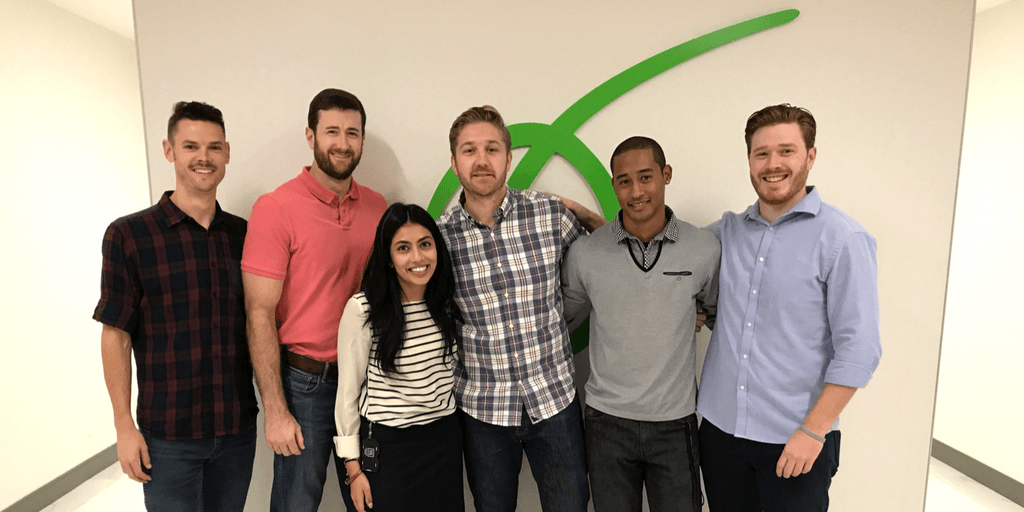We sat down with Austin DeAngelis, VP of sales and employee number five, at Springbot to get insight into his background, perspective on sales management and candidates as well as what differentiates the Springbot experience.
Austin, let’s start with your background, including where you are from and an overview of your college and work experience.
I am a proud Mainer, specifically from Portland, ME. I went to an all-boys Catholic boarding school, played basketball and, while it seemed pre-destined I would go to college in the northeast, enrolled at Emory University after being recruited to play basketball. I decided to apply and commit to the then current basketball coach without telling my parents or visiting the campus. I was highly motivated to get out of the cold weather.
Following college, I went to Boston and got a job bartending while looking for a full-time sales position. I met the VP of sales of Rapid 7 during this bartending stint, and he encouraged me to come in for an interview. Rapid 7 had approximately 40-50 employees and less than $5 million in ARR at the time. I lucked into a great experience: three months after arriving, we received a Series B from Bain Capital, and I rode that growth wave for three years. Eventually, the Rapid 7 founders spun off to start a new business, Axceler, and I hopped over there. It was acquired 18 months later by Metalogix.
Shortly after that exit, and for personal reasons (including the pending arrival of my first son), it was important to move back to the southeast. I evaluated a number of cities, and it was clear Atlanta had the most to offer and was close enough to my family support network. I looked on LinkedIn to find Atlanta + Emory University + technology connections and came up with one: Ashish Mistry of BLH Ventures.
I cold-called Ashish on a Monday from Boston, and he was interested in having lunch on Wednesday (unaware that I was not in Atlanta), so I hustled down that morning to meet with him. Ashish did not have any immediate opportunities but made introductions to four people: Brooks Robinson, Paul Judge, David Cummings and Johnson Cook. That was a pretty amazing slate of people that Ashish so willingly introduced me to in the Atlanta start-up space. I was able to meet with all four, and each was doing very interesting early-stage companies.
What was next in your Springbot story?
In February of 2013, I met with Brooks on a Wednesday, and he asked me to come back in the next day to meet Joe Reger, co-founder and CTO. I was really impressed with both Brooks and Joe — I immediately knew they were the kind of people I wanted to work with. I accepted an offer on Friday, and Brooks wanted me to start the following Monday. This required me to hustle back to Boston, pack up my belongings and drive down to Atlanta by Sunday evening.
A little perspective about where Springbot was as a company at that time: there were five employees. We were located at the Advanced Technology Development Center (ATDC) in a tiny space, and I was sitting across from Joe and Brooks and next to two devs. My role was to hunt and find online stores or brick and mortars that might also be doing eCommerce, figure out what would help those stores and demo with Joe to those customers. What was very cool is that I signed customers very quickly and built the baseline for our target customer and sales approach.
We had a ton of fun in those early days – it was a lot of chopping wood and more muscle than finesse, but we also celebrated when we hit a team milestones and set the foundation for community events that we still do today. Brooks hosted us at his house for the first annual Canadian Thanksgiving. We had our first summer party at Lake Lanier. All of those early team members have a great story about contributing to major business milestones around revenue and customers.
Today, we have a fully productized platform on three eCommerce carts (BigCommerce, Magento and Shopify), and by the end of Q3 this year, we had grown to a team of 35 salespeople. Today’s focus is on sales efficiency and employing the right people in the right channels with the best tools to continue to meet and exceed our goals.
What is your philosophy on sales management?
There are a lot of blogs on this topic, but my take having made the transition from player to player-coach and now to coach involves three things: First, as a sales manager, do you have enough credibility with your team, meaning, can you personally do the job you are asking them to do? Second, as a team grows, you have to move beyond the gut sense to having performance analytics to know who and what team is accelerating or decelerating through all phases of the sales funnel. Third, the most important attribute is emotional intelligence: understanding what motivates the individual to achieve their best and helping them to maximize those strengths. As the sales manager, you have to “bring the (good) weather” to each and every day, interview, training and call. And, of course, to have that emotional quotient, it is important to have a deep level of empathy. Even though sales is at some level an individual sport, it is on the manager to make sure the individual feels part of a team and to be certain the salesperson believes you are invested in them as an individual.
What is your best sales advice to someone starting out or looking to grow their career in sales?
Two pieces of sales advice: First, something my dad said a lot to us growing up, “Remember where you came from.” Be who you are, don’t try to morph into something during the interview process or conform to a culture into something you are not. Stay true to yourself and what makes you unique. Three, constantly be impressive; be your best. You never know who you are talking to in an elevator or a lunch line. Be purposeful in how you talk, your tone and your presence. I tell our sales team all the time: you are the first introduction to our company for our customers. Your tone, your choice of words, your energy, should be impressive to both your customers and colleagues.
You have done a significant amount of interviewing and hiring at this point for Springbot – over 100 interviews in 2017 alone. What characteristics do you look for when hiring salespeople?
We obviously evaluate any sales candidate by their sales track record, but we also consider and weigh the intangibles in candidates. Bringing a high energy, work ethic, coachability and competitiveness to our culture of success is incredibly important to me. It is so evident in an interview if someone is engaged, capable of believing in what they will sell and able to bring positive energy to the team. This is critical because if you can convey your energy level and confidence even through body language and choice of words during an interview, you most likely will be able to translate that to the process of bringing on a new customer.
To me, all the basics still matter during the interview process: do you present yourself professionally; do you make eye contact during an interview; how much do you know about Springbot; what do you uniquely bring to the team (some risk or endeavor you did) and how well do you convey that? Last, but never least, make sure to follow up post interview. A golden rule of sales: if you cannot follow up on an interview with a company you want to work for, how likely are you to dogmatically follow up to get the sale?
What is your favorite aspect of working at Springbot?
Really, there is one thing that I love about Springbot: the people. The senior leadership team is very motivating to me as I am still building my career. It is gratifying and challenging to run a sales team with the level of trust my peers have in me while also providing good advice. And then the sales team, is what gets me going every single day. We have built a team of respect – of our people, our goals, our work area and we are excited to work together each day, which is highly motivating for me. As the team and company progress, it is very rewarding to see team members advance from an opener to a closer, or a team lead to a sales manager. It is really satisfying to be able to provide the same level of mentorship to the team that I have received in my career.
There are highs and lows in any business, and the measure of a good culture is that during those tough times, we are rowing in the same direction, and in the good times, it is a rising tide for everyone.
We have a tradition that each senior leader shares something unique about them to all new Springbot employees…
My last year at Emory, I was working at Atlanta Fish Market and trying to make some walking-around money. I noticed that the fraternities did large family-style dinners one or two days a week. I pulled together and pitched a “lobster bake” for $21 per person. Through my uncle, who is a lobster fisherman, I was able to get a fresh lobster properly shipped to Atlanta, which I then cooked and plated with all the extras for $9.50. I guess this was the first sign I was gravitating toward a career in sales.
Where can we find you on the off hours, on a weekend?
I am a dad of two young sons, and my mother relocated to Atlanta within the last year, so family comes first. Most weekends you will find me at the Grant Park Farmers Market or anywhere that will expend my boys’ energy. The current favorite for my sons is riding Marta (which is also super cost-effective).
What are your best career and life hacks?
First, always be learning, whether it is a personal or professional interest. Find people, blogs, books or podcasts to help build your knowledge, confidence and excitement in what you are pursuing. Second, take care of yourself – eat well, sleep well and stay even-keel emotionally. I use meditation to help me. As your team grows, you have to be able to give to them the support they need. And last, be coachable. No matter what your level or role, be open to taking feedback and striving for more. If you think you are in fifth gear, you probably are not. You can give and do more.
Are you interested in working with Austin and at Springbot? Check out our current openings and core values!




